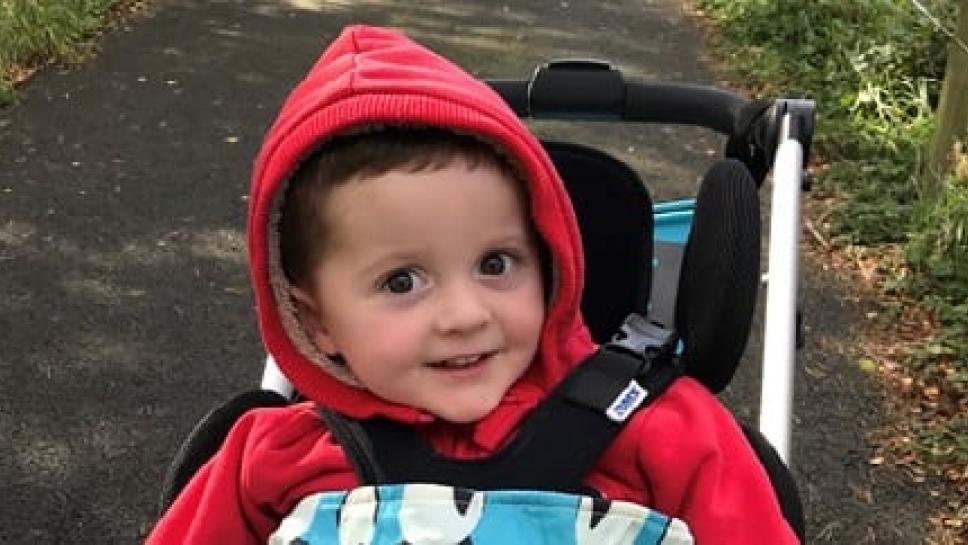
Today, the Scottish Medicines Consortium (SMC) has announced that is has approved the spinal muscular atrophy (SMA) treatment Spinraza for use by children in Scotland with symptomatic SMA Type 1. This is the first treatment for SMA to receive approval for use on the NHS.
What does this mean?
We welcome the news that Spinraza will be available to all patients with SMA Type 1. Spinraza is the first and only treatment for patients with the rare inherited muscle-wasting condition SMA. Without access to the drug, life expectancy for those with SMA Type 1 is rarely longer than two years. However, Spinraza has been shown to improve muscle strength enabling children to crawl, and even walk.
Amy Cameron, 30, from Alloa, Clackmannanshire, Scotland, whose two year old son, Zac (pictured), has SMA Type 1 and has been receiving Spinraza through a temporary special compassionate access scheme, said:
Spinraza gives children with SMA the chance to reach amazing milestones that were never before possible. We are delighted that children like Zac will have access to this life-changing treatment, which has made such a difference to our lives. Since receiving Spinraza, Zac can swing his legs out when we hold him on our knee, and can also hold his head up when I pick him up. He’s never done this before – it’s a complete miracle. The effect Spinraza has on families cannot be underestimated, and it should be available to all who need it.
Robert Meadowcroft, Chief Executive at Muscular Dystrophy UK, said:
Spinraza brings hope to many families and we welcome the news that it will be made available by NHS Scotland to children with SMA Type 1. But we won’t rest until all patients with SMA have access to this treatment. It is now vital that robust data is provided by Biogen to support the argument for access for all people with SMA, as we turn our focus to encouraging the SMC to reassess the drug for other types.
SMA is a devastating and cruel condition, and while it is not a cure, Spinraza can buy many families more time. No parent should have to see their child gradually lose the ability to move, breathe and swallow, particularly while there is a treatment out there which could help.
What about others Types of SMA?
Spinraza also holds promise for people with other Types of SMA and we know that people with other forms of the condition will be understandably disappointed by the SMC’s decision to restrict the treatment’s availability. We share this disappointment. Throughout the SMC appraisal process we made a point, alongside SMA Support UK and SMA Trust, of arguing that all individuals with SMA should have the choice to access the treatment. This was reflected in our patient group submissions, our input at the Patient and Clinician Engagement (PACE) meeting and during the SMC Committee meeting in April.
Dr Sheonad Macfarlane, Muscular Dystrophy UK’s Scottish Council chair, shared her family’s experience of living with SMA at the SMC’s PACE meeting earlier this year. Her nine-year-old daughter, Eilidh, has SMA Type 2. She said:
I understand the decision that has been made, and it is wonderful news for families of children with SMA Type 1; however, many others with the condition will miss out, and naturally this is a huge disappointment. It doesn’t end here, though, and we will keep fighting until all patients with SMA have access to this life-changing treatment.
What happens next?
We would like to thank all the individuals and families who fed into our submission to the SMC. During the process the SMC made regular reference to how influential the personal testimonials were.
We will continue to work with the other SMA charities to ensure that Scottish Government, SMC and NHS Scotland policy does not delay access to emerging treatments for muscular dystrophy and other rare diseases. We know that SMA has been designated an ultra-rare disease which would mean it would be considered differently under the new appraisal processes recommended by the Montgomery Review on Access to New Medicines published in December 2016. These recommendations are due to be implemented in spring 2018. Once implemented, we would urge Spinraza be reassessed for Types 2 and 3 under the new appraisal process as soon as possible.
How you can get involved
- Write to your MSP asking them to contact the Cabinet Secretary for Health and Sport pushing for Spinraza to be reassessed for all Types of SMA.
- Come to our MSP drop-in event around access to treatments in Scotland. You can also ask to meet your MSP at the event or for them to attend on your behalf.
Process in England
The National Institute for Health and Care Excellence (NICE) is in the process of assessing if Spinraza should be made available for NHS use in England. It will look at the drug’s clinical- and cost-effectiveness before publishing its recommendations. We would expect guidance produced by NICE to be followed in Wales and Northern Ireland. We will continue to work with other SMA charities to make sure that patients’ voices are kept at the heart of the process.
For more information
We know the announcement will be difficult for many families in Scotland. We’d like to remind you that we are here to support you. Please call us on our freephone helpline – 0800 652 6352 – or alternatively you can call Samaritans on freephone 116123, if you would like to talk.
For more information about the approval process for Spinraza contact our Campaigns Team campaigns@musculardystrophyuk.org
